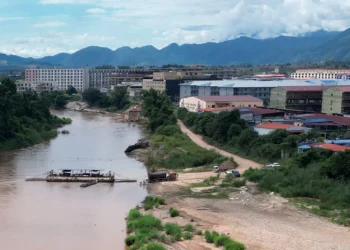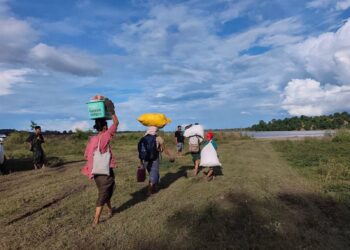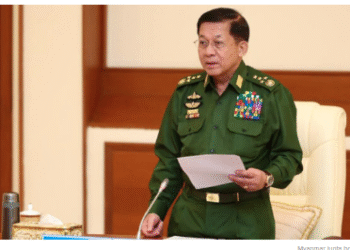April 11 (Reuters) – About 200 Myanmar military personnel withdrew to a bridge to Thailand on Thursday after a days-long assault by the anti-junta resistance, which declared it had won control of the critical border town of Myawaddy, the latest in a string of rebel wins.
Myanmar’s military-run government is battling insurgencies on several fronts and has suffered a series of defeats in frontier areas since last October, when rebel groups launched a coordinated offensive near the Chinese border.
The impoverished Southeast Asian nation has been in turmoil after the military deposed an elected civilian government in a 2021 coup, sparking a nationwide armed resistance that is now operating alongside some long-established ethnic rebel groups.
“Today KNU-led joint resistance forces captured the remaining military base in Myawaddy,” Kyaw Zaw, a spokesperson for Myanmar’s National Unity Government, told Reuters.
The body is a shadow administration of ousted lawmakers and anti-junta groups.
“This is a crucial victory for our revolution since Myawaddy is an important border town for the junta, one of the main (sources of) income from border trade,” he added.
A spokesperson for the Myanmar junta did not respond to telephone calls to seek comment.
The retreat of junta troops in Myawaddy, adjacent to the Thai town of Mae Sot, signals the potential loss of another key border trading outpost with direct highway access to parts of central Myanmar.
On Thursday, about 200 fleeing Myanmar soldiers gathered at a border crossing into Thailand, said Saw Taw Nee, spokesperson for the Karen National Union (KNU), an anti-junta group leading the assault on Myawaddy.
News outlet Khit Thit said Thai authorities were in talks with the soldiers to decide whether to grant them refuge.
BORDER CROSSINGS
The assault on Myawaddy began last week after the KNU said it had attacked a junta camp near the town, forcing some 500 security personnel to surrender, along with their families.
The military has already lost control of areas along Myanmar’s borders with Bangladesh, China and India, while suffering a significant loss of manpower that has pushed it to introduce a draft for the first time.
“Next the resistance forces might go after major towns across Myanmar,” said political analyst Than Soe Naing, adding that Myanmar’s resistance forces control almost all border trading posts after the latest takeover in Myawaddy.
Border crossings in the area were open for civilians who were arriving in Thailand from Myanmar in large numbers, said police official Borwornphop Soontornlekha, the immigration superintendent in Tak, the province where Mae Sot is located.
“Usually there are about 2,000 people who cross into Mae Sot from Myawaddy each day but the last three days the number was almost 4,000 a day,” Borwornphop told Reuters.
Families with children were among the long queues at one border crossing near Mae Sot on Thursday, as Thai soldiers checked the bags and belongings of those going across.
Thailand’s military has stepped up security on its side of the border, using army vehicles equipped with roof-mounted machine guns.
Thai Prime Minister Srettha Thavisin, who earlier told Reuters the Myanmar junta was “losing strength” and pushed to open talks with the regime, said on Thursday the recent fighting should not spill into his country’s airspace.
Thailand remains neutral in the Myanmar conflict and is able to accept up to 100,000 people displaced by the turmoil, its foreign minister has said.
At least 2,000 people have been displaced within Myanmar by the latest round of fighting between the rebels and the military, according to civil society group Karen Peace Support Network.
The Reuters Daily Briefing newsletter provides all the news you need to start your day. Sign up here.
Reporting by Panu Wongcha-um in Bangkok and Reuters staff; Writing by Devjyot Ghoshal; Editing by Kanupriya Kapoor
Our Standards: The Thomson Reuters Trust Principles.






